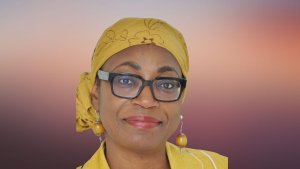In this interview, Dr. Folashadé Soulé and Dr. Camilla Toulmin speak with Pr. Mzukisi Qobo. Pr Qobo is the Head of the Wits School of Governance, University of Witwatersrand, South Africa.
In this interview, Dr. Folashadé Soulé and Dr. Camilla Toulmin discuss with Pr. Mzukisi Qobo. Pr Qobo is the Head of the Wits School of Governance, University of Witwatersrand, South Africa. He also serves on President Cyril Ramaphosa’s Economic Advisory Council. In the past, he has held a senior leadership role in government as chief director responsible for developing South Africa’s trade policy at the Department of Trade and Industry. His expertise is in governance, strategy, and political economy. His book, The Political Economy of China-US Relations: Digital Futures and African Agency, will be published by Palgrave Macmillan, 2022.
Let us start with a general question: what is your opinion of how the South African government has handled the COVID crisis so far? South Africa is the African country with the highest official case rate. How do you assess the policies that were implemented to handle the pandemic?
I think we started very late. It was a very long lockdown because it lasted between March and August of last year, and I think that this period should have allowed us and many other countries that were in the lockdown phase an opportunity to build our capabilities, to replenish our resources, to prepare our public health facilities, and to think about a credible plan for how to manage the crisis post-lockdown. I think our responses in the first and the second phase were really poor because we didn’t put in place any of the measures that the government said they were going to put in place, because the primary goal of the lockdown was not so much to get rid of the virus, but to enable the public health facilities to manage the numbers. If you prevent people from interacting, you should slow down the rate of infection. But that didn’t happen. Instead, what we saw during that period was just a large-scale opportunity for the production of personnel productive equipment that was purchased through private suppliers, and we saw how individuals who were connected to those in government benefited irregularly from that.
So the country’s energies got caught up in that tension. Public trust in government declined, and instead of paying full attention to the challenges at hand, we were trying to tackle corruption at the same time. When the second wave hit in December 2020, we were just unable to deal with it. I think many deaths and hospitalizations took place during that period. Then there is the politics of vaccines, and the power play between the pharmaceutical companies and government. Then we got the third wave. Where we kind of did well was in the rollout of the vaccines: we accelerated the rollout and I think now we probably are at above 10% or just under 15% of the population fully vaccinated. Of course, there are a new set of challenges, such as the daily take up of vaccination, which is very slow. The government has again not prepared itself for such eventualities, and we’ve been unable to go out and persuade people to get vaccinated and maybe induce them with incentives. So overall, it’s been a mixed response, but by and large, I think we didn’t do great.
There are several debates currently around access to vaccines in Africa, which brings us to the larger question of local manufacturing. South Africa is one of the few African countries that has the capacity to do so. What is your analysis of the lack of local manufacturing on the continent?
I think it’s a long overdue question because we’ve been through multiple episodes of disease on the African continent. The fact that we don’t have full manufacturing capabilities is a reflection of our weakness and shows that we are not a resilient continent. We are heavily dependent on others, and that’s a function of overall capabilities, such as the number of medical doctors, scientific capabilities, and the delivery mechanisms, like the logistics required to deliver vaccines. I do think that the advanced industrial economies have a heavy responsibility for making vaccines available, because they had promised to donate vaccines via the COVAX facility and there have been very significant delays. Some countries like Canada purchased doses four times what the population required and this set the stage for “vaccine diplomacy” and geopolitical competition between China, Russia, and the US for vaccine distribution. But it also intensified vaccine nationalism.
Regarding manufacturing capacities, it’s a very intricate and very complex area. If an individual country develops manufacturing capabilities which rely on exports to other African countries, it presents a problem because there might be no market. Vaccines are both a commodity, but they also save lives. And someone has to pay for them. Governments looking at developing manufacturing capabilities need to weigh up the fiscal capacity of government and the need to promote your own manufacturing. If governments can buy vaccines cheaper from outside the continent, why should they not do that? Yet I still think we need to build our own capabilities, these are the moral tensions. The second reality is that African countries don’t have significant scientific capabilities to manufacture vaccines. Just last week, there was an announcement of a major technology transfer initiative to start the early phase of a new vaccine for cancer, in Cape Town which is good.
The simple answer is yes, we should manufacture vaccines in Africa, but we need to be aware of all the complexities entailed in doing so, and the capabilities required. And then the final point is that just about every other country on the continent wants to be a vaccine manufacturer. It’s becoming fashionable, so we should find a way to create cross-border supply chains to optimally utilize capacities at different stages of development in various African countries.
It’s been interesting learning from our interviewees about the role of other key actors during the COVID pandemic. What has been the role of national government, provincial government, and civil society during the pandemic? If you take a case like Senegal, which has a fairly strong state, we heard a lot about the importance of local associations, very often religious in origin, that played an absolutely vital role, particularly in the first phase.
I think it’s an important question. Based on my own observation, I think there’s been too great a distance between the state and civil society, and you can see this disjuncture in the narratives about vaccines. Negative messages have evolved and spread in communities and across society about vaccines being poisonous and other myths. We’ve not been so successful, in working closely with different civic structures, religious leaders and the like, not just in terms of vaccines, but also in terms of helping to build resilience at community level. Many of the most vulnerable communities were heavily affected by lockdown conditions. People live in single-room structures which serve as a kitchen, a bedroom, and living space for a whole family. When you lock people up, that means you force them to be in their homes, but you’re not thinking about the differential resources across society. In your head, as a politician and decision-maker, because you live in a comfortable house, you think everyone has a yard to walk around in. I don’t think we considered this sufficiently as a society and country. It could have been handled better if government from the outset had worked with community or civic structures that are facing these difficulties. I think we underestimate the extent to which people have been affected psychologically and emotionally by the first phase of the pandemic. We are now countenancing the fourth phase of managing the pandemic in the next few months, but we’re not treating any of the ill-effects that emerged from each of the previous phases and trying to build greater resilience. One of the fascinating discussions in South Africa currently is whether we should set up a basic income grant, and what form and shape should that take; but this is happening all in the abstract, not grounded in the realities of what has happened in the last 18 months. We’re not taking into account the depletion of capabilities in communities, job losses and the range of effects that were wrought at a personal, household, and community level. No one wants to think innovatively and creatively, no one wants to shift the box, let alone think outside the box. No one wants to do bold things that have never been done before. Our approach is very linear, which is very sad. What government did well was to work with the private sector on the delivery side. As soon as government agreed to partner with the private sector, they moved really quickly from vaccinating 4% of the population to reach 15% within three to four months. That is not to say working with the private sector is a magic bullet for society, but working with key structures in society, including the private sector, could create much bigger gains for government than trying to do it all on their own.
We are still in the midst of the pandemic, but many governments are already thinking about the post-pandemic world and economic recovery programmes. How does this crisis offer an opportunity to rethink development models on the continent? Regarding health, for instance, more funding for health infrastructure should be at the core of economic policies more generally. Looking at the South African case, and more largely on the continent, how might this crisis be an opportunity to rethink development models?
I certainly agree we should rethink development models. Major crises in history have always forced a rethink in approach, especially in regards to the role of the state, whether it was the depression years of the nineteen-thirties, post-World War two, the recession of the seventies, or during the global financial crisis. A major crisis should force us to rethink how we do things, especially in managing the relationship between the state, market and society. I think these relationships have to be rebalanced all the time. The old mantra about growth has reached exhaustion, and all market actors are going to have to show how they contribute to society, health infrastructure, education, and public services. I think with COVID 19, we are at a crossroads and must re-think economic policy, social policy, and our health infrastructure.
This pandemic came at a time when, in South Africa, we were talking about setting up national health insurance, a programme that had already been delayed for over a decade. It has still not been implemented. One would think that the COVID crisis would force us to get the national health system into shape. I think the crisis gives us a creative opening to experiment with a basic income grant, and other ways to build civic and community capabilities, and not rely narrowly on the market for everything.
The fact that many countries closed their borders means there has been an emphasis on localization, and on self-reliance. In some places, there has also been investment in industrial robotics, instead of shifting supply chain production to areas that have abundance of labour. This is especially apparent in countries like China and elsewhere in Asia, which will make it difficult for African countries to develop manufacturing, so that’s the first set of challenges you have.
The second is the whole green transition and risks of a carbon tax adjustment at the border. If African countries still rely on traditional industrialization, their products will attract taxes at the border because their carbon footprint will be deemed too large. We face a real dilemma on the continent, in terms of the pathway to development, and certainly we need to rethink development models, but it’s not going to be easy. We should think about reviving agriculture and agro-processing, and areas of the service economy that could help us modernize, but also absorb labour. The major thing we must do is greater investment in education, because as long as education levels aren’t high enough, we are going to lag behind other developing and emerging economies. The world is moving on and you have limited options with low skills. It’s easy to talk about industrialization, and new development path pathways, but if you don’t have the critical success factors, education being one of those, you simply are not going to compete in this changing world.
Energy is absolutely critical for economic and industrial development. Currently South Africa has massive dependence on coal for energy and industrial production. I know there’s been some work done in South Africa on what a just transition would look like. There are massive amounts of labour and capital, and many communities bound up in the current high carbon coal economy. What timeframe do you think South Africa should be thinking about, to try and achieve this remodelling of the whole energy system not only in terms of getting out of fossil fuels, but also expanding energy production so that it becomes available to everybody at reasonable cost?
I don’t think it will take less than a generation to achieve a noticeable transition. It’s happening in very small steps. Some banks are announcing they will no longer fund coal projects, which is a big step. Companies like Exxaro , which was the second largest coal producer in South Africa, has been making investments in renewable energy in partnership with India’s Tata through their spinoff Cenergie. Also there’s a pressure from advanced industrial economies through their support to NGOs in South Africa, which has generated a lot of talk about the green transition in South Africa, but less about what the “just” component of the transition would look like. The bulk of unemployed people in South Africa, unskilled or semi-skilled, belong to labour-intensive sectors in the old industrial economy. And for the longest period of time, since the seventies, the major driver of employment in South Africa has been industry (largely powered by coal-fired power stations), and all the midstream sectors. Now to take that away, you’ve got to deal with the large section of the population that would be unemployed, and all the social challenges that are associated with it.
There’s a lot of talk about climate finance, but it’s all just talk, no-one can see the content. Going back to the question of skills, moving people from old industries to a new industrial sector, you’ve got to go all out in education because the current green jobs are usually unsustainable, and short term in nature. They are like construction jobs. You assemble, with most of the components coming from China, Spain, and Denmark. An important part of sustaining economic prosperity on the back of green transition is for governments to be ready to create incentives and put resources behind such a transition; and place conditionalities for local ownership, training and development, and employment.
Currently there are very few African companies that are manufacturing “green economy” components. We simply are responding to the pressure to reduce our carbon footprint, to meet certain targets, to follow the lead of the EU. No one says we must stick to the old economy, but we’ve got to be careful about how we pace the transition, and how government, the private sector, and communities work together to solve the real equity challenges that this debate throws into sharp relief.
Let me ask a final question on global governance. Generally, the pandemic has demonstrated that multilateralism is key to address global challenges, but we’ve also seen some countries prefer bilateralism and nationalism, as you mentioned early on in relation to vaccines. What do you think will be the future of multilateralism after COVID and specifically Africa’s place in the international system? I know you have a book coming out soon on China-US relations and the question of agency. How do you think African actors, African governments can exercise more agency in this fragmented world?
I think the world will remain fragmented for a while, for a number of reasons. We really underestimate the extent to which the Trump era eroded goodwill in multilateral processes, because the US has always been, since the end of World War two looked up to as the leading power in underwriting international processes and institutions. Post-Trump, the world has battled to rebuild the multilateral foundations, especially because the relationship between the two largest economies in the world - China and the US - has not improved. Instead, it has continued to weaken. Tensions between the two continue pretty much in the same way as was the case under Trump, except that the tone is slightly more civil. I think the tensions and rivalries are deepening, if you follow the AUSUK submarine story around building military capabilities in Asia Pacific. The flashpoints are going to expand the points of intensity in that relationship. COVID 19 has further driven a wedge between these major powers: the US and China, but also Europe, where the European Union has to think of its future beyond reliance on the US. They have learned a hard lesson under Trump, that you cannot place your faith in the US, because of the nature of their political system, which can bring you a terrible president that takes some crazy positions on international issues. Multilateralism isn’t what it used to be because countries are likely to go down regional routes and worry about their more immediate spheres of influence.
The EU is already in good space because they operate in an integrated area. It’s not a perfect mechanism, but I think the EU has been a source of resilience for its member countries. It’s able to respond pretty quickly to crisis issues, even though they are intense, as for example, in the Eurozone, with the Greek crisis, or to tensions around how countries manage their vaccine supplies, and more recently to issues related to the European economic recovery plan. The tensions are there, but the Union is able to find consensus because everyone knows that if they are invested in the project, it’s good for everyone and no-one would be left behind. I think there’s a lot that Africans can learn from that. Our agency is also constrained by the behaviour of our elites, corruption, the weakness in the democratic space in different countries, plus state-society tensions in much of the African continent. Among the things that African countries need to do to bolster their agency, many lie at the domestic level. They’ve got to get the domestic context right, domestic institutions, inclusive institutions, taking care of the economy, and all those basic elements. Secondly to start to look beyond, not only the domestic setting but be concerned about the country and continent’s interests, Working together to strengthen certain areas, for example the AfCFTA, gives the continent a rare opportunity to develop cross border supply chains, to harmonize regulations around areas related to services, intellectual property investments, and e-commerce, but also to build some of the key institutions, such as the Centre for Disease Control (CDC Africa), to direct resources to rebuild existing institutions some of which have been neglected. Finally in relation to external action, we must take a more pragmatic posture rather than just put all our eggs in the same basket, whether its China or the US. We must diversify our international relations strategy and know that these other countries are not our friends. They are also in search of their own interests. That’s how you’ve got to approach commercial diplomacy or bilateral relations with these countries. And we must start to develop a “One Africa platform”, not on everything, but where it makes sense, especially if by doing so we can derive greater benefits from external engagements. The COVAX and the AU Accelerated programme platform were some of the examples of what is possible, and though I don’t think we managed them that well, we have something to build on.
About the COVID-19 and Africa series: a series of conversations conducted by Dr. Folashadé Soulé and Dr. Camilla Toulmin with African/Africa-based economists and development experts about their perspectives on economic transformation and how the COVID situation re-shapes the options and pathways for Africa’s development - in support of INET’s Commission on Global Economic Transformation (CGET)







